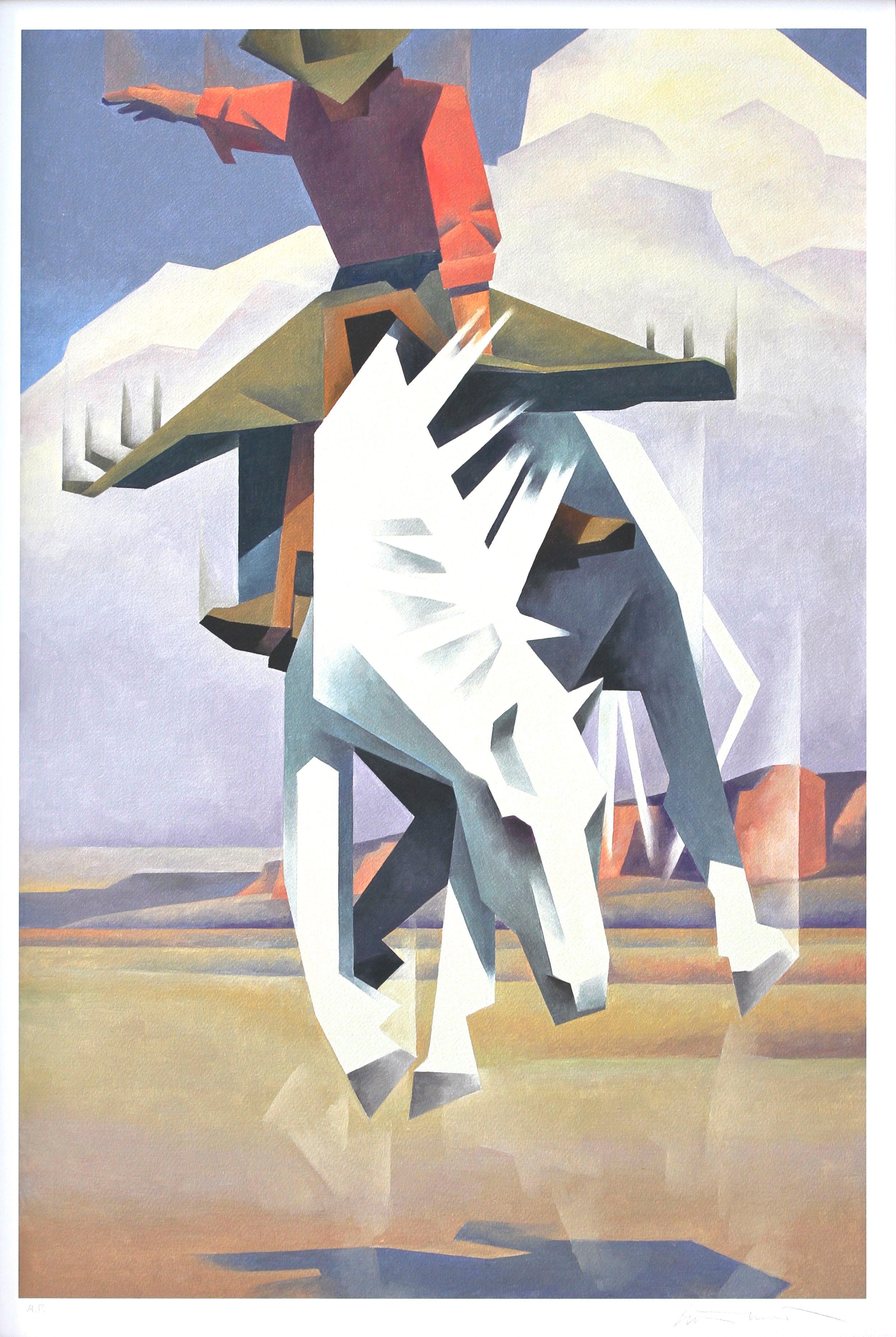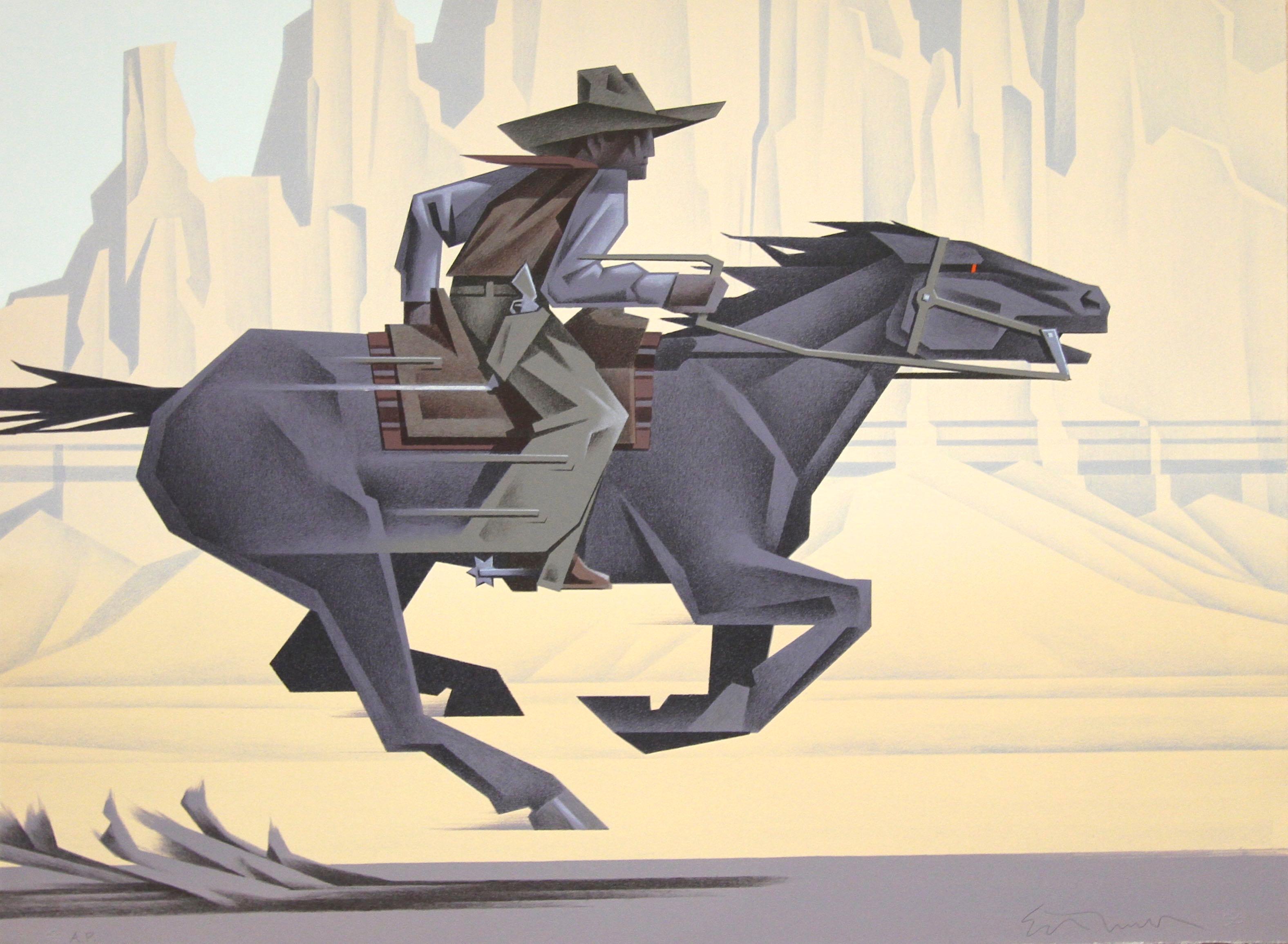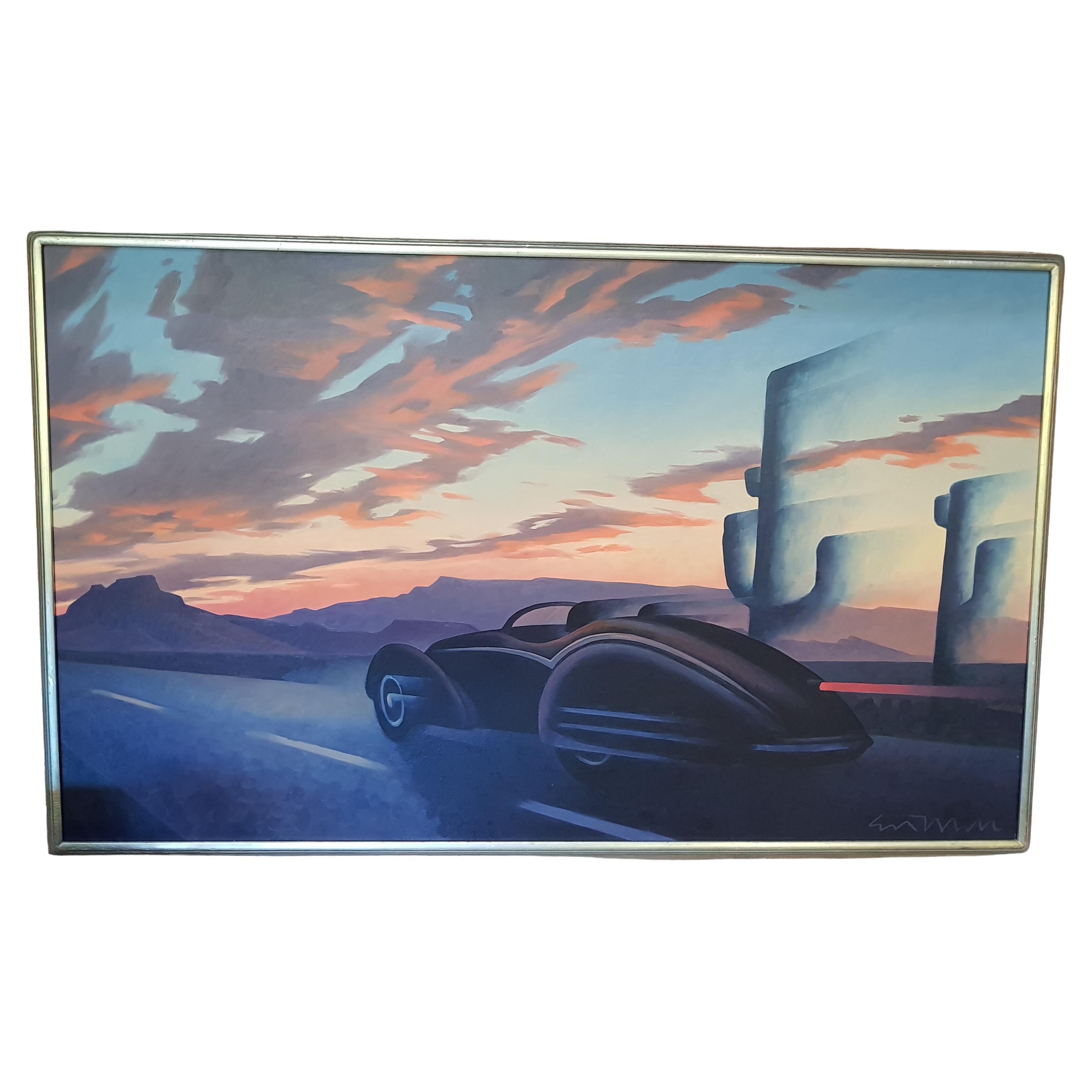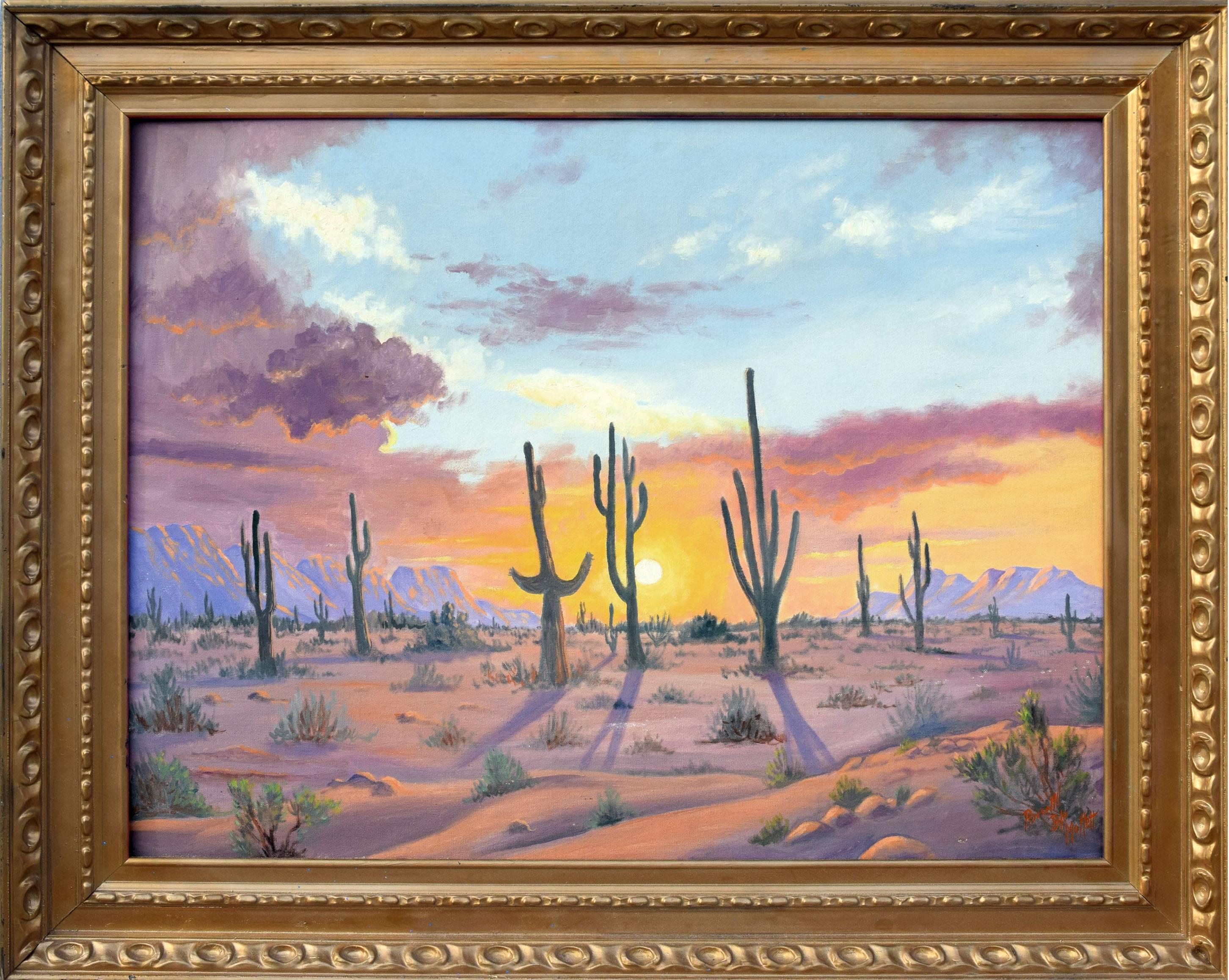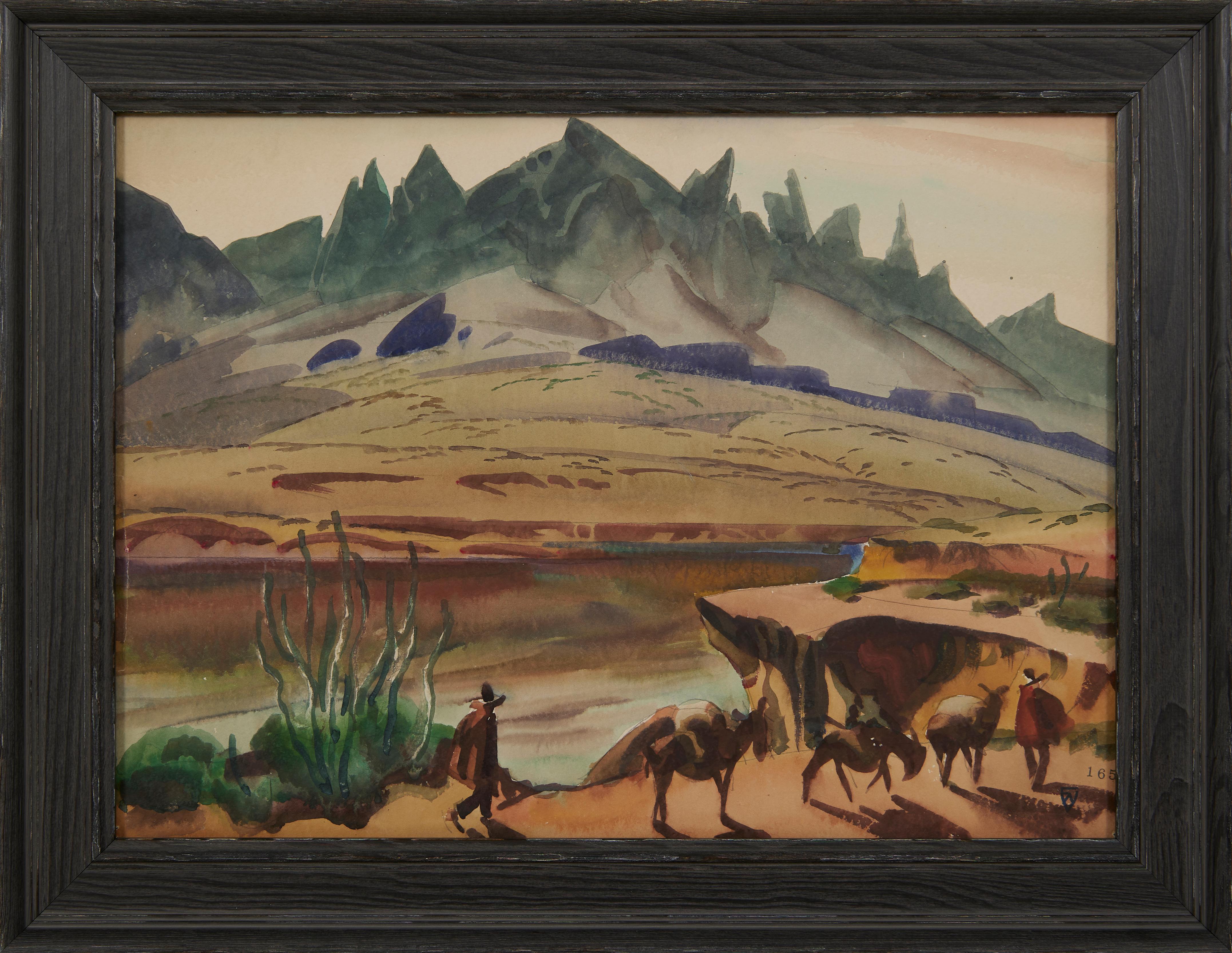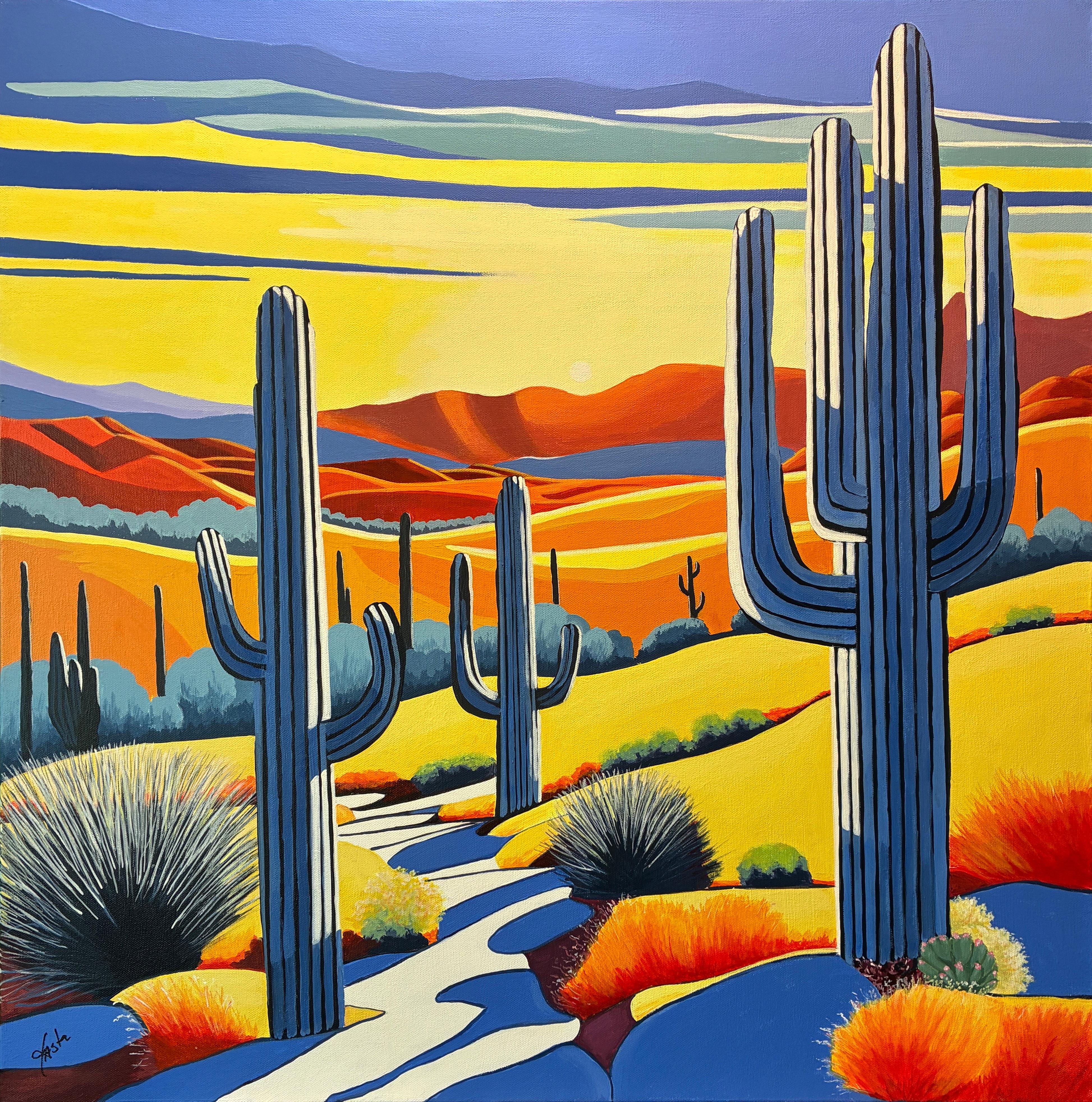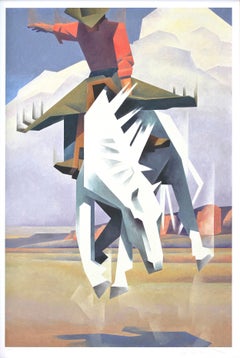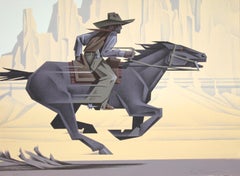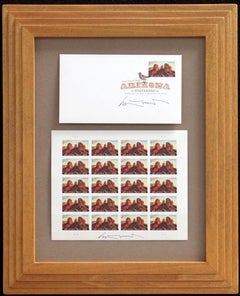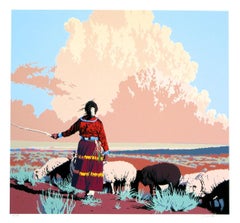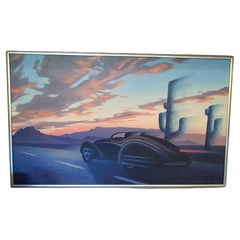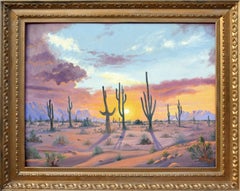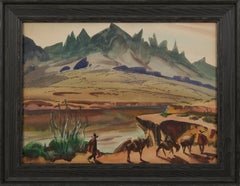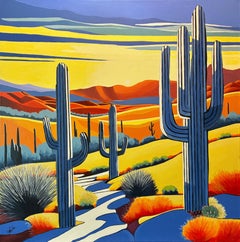Items Similar to Sonoran Kings by Ed Mell
Want more images or videos?
Request additional images or videos from the seller
1 of 5
Ed MellSonoran Kings by Ed Mell2022
2022
$2,700
£2,050.33
€2,370.06
CA$3,794.59
A$4,225.27
CHF 2,234.42
MX$51,419.01
NOK 28,165.41
SEK 26,535.96
DKK 17,688.38
About the Item
"Sonoran Kings"
Ed Mell 1942-2024
Stone lithograph
32" x 24"
**PRINTS ARE ESTATE SIGNED WITH WITH EMBOSSED LOGO AND SIGNATURE STAMP***
Edition. 200, 2020
Print is unframed.
Biography
Ed (Edmund) Paul, Jr. Mell
Born in 1942, Ed Mell spent an idyllic childhood in what was then the small western city of Phoenix, Arizona. He began drawing at a very early age, inspired by the automobiles and futuristic design of the late ‘40s and ‘50s. After attending Phoenix Junior College, a burgeoning interest in advertising and illustration led him to attend Art Center College of Design in Los Angeles. Although an advertising major, he was still able to vicarously experience the school’s world renowned automotive design department through several of his friends.
After Los Angeles, Ed went on to work at Young and Rubicam, one of the top advertising agencies in New York, and Kenyon and Eckhardt where he worked on such major accounts as Helena Rubenstein and Air France. Finding art directing creatively stiffling, he moved onto illustration, becoming one of the first airbrush artists to emerge in the 60’s. His skill in this newly rediscovered medium attracted clients such as Tang and National Lampoon, the latter of whom he did two covers for.
It was after two summers teaching art on the Hopi reservation that Ed decided to return home to Arizona’s Sonoran desert. “Spending months in that beauty right after being in the city was the catalyst that changed my artistic direction.”
Ed’s first works in oil were very minimal and angular, while later he moved onto more naturalistic expressions of the Western landscape. Ed still paints in both styles today, and began making bronze sculptures in the ‘80s. His work is in many corporate and private collections, nationally and internationally, including China and Mexico. Some of the collectors include, Diane Keaton, The Forbes Collection and the Anschutz Collection. The Phoenix Art Museum, Tucson Museum of Art and the Denver Art Museum, all permanently own his work.
Several large scale works have also been commissioned by public works, including an eight and half foot tall bucking bronco, a mural-esque painting for the visitor’s center of Kartchner Caverns, and most recently a bronze of a rising phoenix for Phoenix City Hall. In 1996 his life as an artist was chronicled in the Northland Press book “Beyond the Visible Terrain: The Art of Ed Mell.” Regardless of style or medium, Ed is most renowned for his uncanny ability to capture the power of his awesome subjects, whether a brewing desert storm that dwarfs the tallest of mountains, or an animal frozen in violent action.
Corporate Collections
Collier Gallery
Atlantic Richfield Corporation, Los Angeles, California
Tri-Star Pictures, Hollywood, California
Chase Bank, Phoenix, Arizona
Mountain Bell, Denver, Colorado
Loews Ventana Canyon Resort, Tucson, Arizona
Mary Kay Cosmetics, Dallas, Texas
Northern Trust, Phoenix, Arizona
Museum Collections
Scottsdale Museum of Contemporary Art
Phoenix Art Museum, Phoenix, Arizona
Desert Caballeros Western Museum, Wickenburg, Arizona
Tucson Museum of Art, Tucson, Arizona
Denver Art Museum, Denver, Colorado
Booth Western Art Museum, Cartersville, Georgia
Leanin’ Tree Museum of Western Art
Public Collections
City of Scottsdale, Scottsdale, Arizona
City of Glendale, Glendale, Arizona
City of Phoenix, Phoenix, Arizona
Kartchner Cavern State Park, Benson, Arizona
Private Collections
Diane Keaton, Beverly Hills, California
Arnold Schwarzenegger, Los Angeles, California
Stephane Janssen, Scottsdale, Arizona
Joseph Coors, Denver, Colorado
Phil Anschutz, Denver, Colorado
Bruce Babbitt, Phoenix, Arizona
Kip Forbes, New York, New York
Craig and Barbara Barrett, Paradise Valley, Arizona
Commemorative Centennial Stamp USPS for the State of Arizona 2012
Partial listing of Exhibits & Printed Publications:
Exhibitions & Shows
Long Beach Museum of Art, Long Beach, California
Phoenix Art Museum, Phoenix, Arizona
Center of Modern Art, Guadalajara, Mexico
Scottsdale Center for the Arts, Scottsdale, Arizona
Kolb Studio at Grand Canyon National Park, Arizona
Phippen Museum, Prescott, Arizona
Tucson Museum of Art, Tucson, Arizona
The Rockwell Museum of Western Art, Corning, New York
Museum of Northern Arizona, Flagstaff, Arizona
Booth Museum of Western Art, Cartersville, Georgia
Forbes Galleries, New York, New York
Book Publications
Beyond the Visible Terrain in the Art of Ed Mell
The Majesty of the Grand Canyon: 150 Years in Art
Phoenix Art Museum Collection Highlights
Painters of Utah's Canyons & Deserts
Magazine Publications
Leading the West
Southwest Art
American Artist
Arizona Highways
Western Art Collector
True West
Western Interiors & Design
Phoenix Magazine
- Creator:Ed Mell (1942, American)
- Creation Year:2022
- Dimensions:Height: 32 in (81.28 cm)Width: 24 in (60.96 cm)
- Medium:
- Period:
- Condition:
- Gallery Location:Phoenix, AZ
- Reference Number:1stDibs: LU2623215168192
About the Seller
No Reviews Yet
Vetted Professional Seller
Every seller passes strict standards for authenticity and reliability
1stDibs seller since 2023
6 sales on 1stDibs
- ShippingRetrieving quote...Shipping from: Phoenix, AZ
- Return Policy
Authenticity Guarantee
In the unlikely event there’s an issue with an item’s authenticity, contact us within 1 year for a full refund. DetailsMoney-Back Guarantee
If your item is not as described, is damaged in transit, or does not arrive, contact us within 7 days for a full refund. Details24-Hour Cancellation
You have a 24-hour grace period in which to reconsider your purchase, with no questions asked.Vetted Professional Sellers
Our world-class sellers must adhere to strict standards for service and quality, maintaining the integrity of our listings.Price-Match Guarantee
If you find that a seller listed the same item for a lower price elsewhere, we’ll match it.Trusted Global Delivery
Our best-in-class carrier network provides specialized shipping options worldwide, including custom delivery.More From This Seller
View AllEd Mell, This Palomino Ain't No Pal of Mine, Giant Size, 54 x 36 in , Special Ed
By Ed Mell
Located in Phoenix, AZ
This Palomino Ain’t No Pal of Mine 1982
Giant Size, Special Limited Edition
Archival Pigment Print
Original Pencil Signature, Signed Lower Right
Made in collaboration with Ed Mell
...
Category
1980s Contemporary Figurative Prints
Materials
Digital
Full Speed Ahead by Ed Mell
By Ed Mell
Located in Phoenix, AZ
Full Speed Ahead 1985
Ed Mell 1942-2024
Original signature lower right
Stone Lithograph
22 x 30 inches
MINT CONDITION. NEVER FRAMED!
SHIPPING CHARGES INCLUDE SHIPPING, PACKAGING...
Category
1980s Figurative Prints
Materials
Lithograph
Arizona Centennial First Day Issue Stamps and Envelope, autographed by Ed Mell
By Ed Mell
Located in Phoenix, AZ
Ed Mell 1942-2024
Original signatures on stamps and envelope.
Custom presentation frame.
Arizona Centennial Commemorative Stamp, Arizona First Day of Issue by Ed Mell, 1942-2024. C...
Category
21st Century and Contemporary Contemporary More Art
Materials
Postcard
Bill Schenck, Last Horizon, Serigraph
By Bill Schenck
Located in Phoenix, AZ
SHIPPING CHARGES INCLUDE SHIPPING, PACKAGING & **INSURANCE**
Last Horizon, 1991
Bill Schenck
Serigraph, Printers Proof
Size: 27.75 x 29.75 inches
UNFRAMED
SHIPPING CHARGES INCLUDE...
Category
1990s Contemporary Landscape Prints
Materials
Screen
Down to the Valley by Bill Schenck
By Bill Schenck
Located in Phoenix, AZ
Down in the Valley
Bill Schenck
Serigraph 46/50
Edition of 50
Image size: 25 x 29 inches
Paper size: 31 x 35 inches
SHIPPING CHARGES INCLUDE SHIPPING, PACKAGING & INSURANCE
UNFRAM...
Category
1990s Contemporary Figurative Prints
Materials
Screen
Wide Open by Greg Singley
Located in Phoenix, AZ
Title: Wide Open
Artist: Greg Singley
Archival Pigment Print
100% Cotton Rag 300gm
Image size: 20 x 32.625
Paper size: 24 x 36 inches
Greg Singley
Greg Singley – was born in 1950 in Greensboro, Alabama. He received his Associates Degree at Walker Collage Jasper Alabama and furthered his college education at the University of South Alabama, Mobile Alabama. He attended the revered Ringling School of Art for his art training in Sarasota Florida and graduated with honors with a certificate in commercial illustration.
In 1978 Singley moved to Phoenix Arizona to pursue his passion for western art and illustration. He worked for several years as an art director for Phoenix Public News and as a freelance illustrator and at the same time experienced sales of Native American and Western Landscape in several Arizona galleries which include Ratliff Williams Gallery, Sedona Arizona, Fagan Peterson Fine Art, Scottsdale and the Dan May Gallery, Scottsdale Arizona.
After a foray into freelance illustration Singley sought representation for his varied abilities and interest in fine art and found the Phoenix Art Group...
Category
2010s Contemporary Figurative Prints
Materials
Archival Pigment
You May Also Like
Ed Mell Desert Vibe Sunset oil on canvas original painting
Located in Palm Beach, FL
Ed Mell is an American painter inspired by the Arizona and Sonoran Desert. The dramatic skies, landscapes, gorgeous sites of nature are subjects Ed Mell interprets with sophisticate...
Category
1990s Paintings
Materials
Canvas
Mid Century Desert Cactus Sunset Landscape by Russell Dale Moffett
By Russell Dale Moffett
Located in Soquel, CA
Mid Century Desert Cactus Sunset Landscape by Russell Dale Moffett
Experience the splendor of the desert at sunset in this stunning mid century landscape by Russell Dale Moffett (American, 1899-1984). This striking 1959 landscape features tall cacti casting long shadows as they are bathed in warm light by an orb of golden sun. As the sky lights up in a burst of color, the desert sands are illuminated in a beautiful warm glow. Russell Dale Moffett's impressive attention to detail and realistic style leave a lasting impression on the viewer.
Signed "Russell Dale Moffett" lower right.
Presented in a giltwood frame.
Canvas size: 24"H x 30"L.
Framed size: 37"H x 31"W x 2"D.
Regarded as a quintessential outsider artist, Russell Dale Moffett’s work has begun to attract collectors’ serious attention. Born in Indiana, by 1942 he had settled in San Diego and was a muralist. A large proportion of his output was created to decorate the bars and dives of those honky-tonk neighborhoods in downtown San Diego that catered to the soldiers and sailors that passed through in the boom war years when it was a liberty town. Much of his work must have been lost to gentrification and urban renewal. Some of it is just now coming to light. One of eight lost Hawaiian Surfer...
Category
Mid-20th Century Impressionist Landscape Paintings
Materials
Canvas, Oil
$5,200 Sale Price
20% Off
Colorado River, Needles, California, 1950s Western Landscape, Cleveland School
By Frank Wilcox
Located in Beachwood, OH
Frank Nelson Wilcox (American, 1887–1964)
The Colorado At Needles, California, c. 1950
Watercolor on paper
Monogram lower right, titled verso
14.5 x 20 inches
18.5 x 24 inches fram...
Category
1950s American Modern Landscape Drawings and Watercolors
Materials
Watercolor
Saguaro Sunrise, Original Painting
Located in San Francisco, CA
Artist Comments
Tall Saguaro cacti dot a hilly southwestern landscape. The rising sun casts long, dramatic shadows that stretch across the terrain. Bright reds, blues, and yell...
Category
21st Century and Contemporary Pop Art Landscape Paintings
Materials
Acrylic
"Superstition Mountains"
By Claudia Hartley
Located in Scottsdale, AZ
"The comment I hear most often about my paintings is 'happy'". I've loved art all of my life and it warms my heart to know that I'm able to pass that love and joy on to others. I use...
Category
2010s Landscape Paintings
Materials
Canvas, Acrylic
DEATH VALLEY SUNSET
Located in Portland, ME
Whitehead, Buell (American, 1919-1993) DEATH VALLEY SUNSET. Lithograph in colors, 1946. Edition size not known. Signed and dated in pencil, lower right. I...
Category
1940s Landscape Prints
Materials
Lithograph
